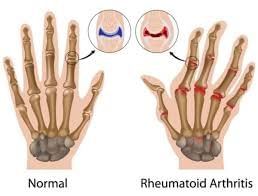What Is Rheumatoid Arthritis?
Rheumatoid arthritis is an autoimmune condition wherein the immune system attacks the body’s own healthy body tissue. In this disease, the immune system sends antibodies to the lining of joints and triggers the tissue surrounding the joint. Due to this, the soft tissues covering the joints become sore and inflamed. If the illness goes untreated, then it may damage the shape and alignment of the joint.
Rheumatoid arthritis, unlike osteoarthritis, affects the joint linings and causes swelling and pain which may eventually lead to erosion of bones and deformed joints. The inflammation resulting from rheumatoid arthritis may damage other body parts as well.
Arthritis if aggravates further can, however, be debilitating. The synovium (lining fluid for the joints) gets thickened as a result of the inflammation which with time may damage the bone, cartilage and parts of the joint. The ligament and tendons holding the joints get stretched and weakened.
What are the 4 stages of rheumatoid arthritis?
There are four stages of rheumatoid arthritis and each one has its own treatment options.
Stage 1: This is the early stage in which the synovium is inflamed. Though the joint is not damaged, however, the tissue around is swollen causing joint pain.
Stage 2: This is the moderate stage wherein the cartilage is damaged making the joint stiff which reduces the range of movement or mobility of joints.
Stage 3: In this stage, inflammation wears out cartilage and the ends of bones. Joint instability and deformities in the movement are noticeable changes in association with pain, swelling and loss of motion.
Stage 4: This is the severe stage of rheumatoid arthritis where joints are completely damaged and stops functioning. The patient will have pain, swelling, stiffness and struggle with lack of motion. Muscles also become weak and joint replacement may be the considered treatment option at this stage.
What are the early signs of rheumatoid arthritis?
These are considered to be the first signs of rheumatoid arthritis:
- Fatigue: This is the foremost sign which is usually observed before any other symptoms where the person might feel extremely tired and weak. It is attributed to the body’s reaction against inflammation of joints. Fatigue affects daily activities, relationships and productivity at work.
- Low-grade fever: It is also caused due to the inflammation in joints and accompanies the fatigue.
- Weight loss: Unexplained weight loss and decreased appetite are a key sign of rheumatoid arthritis.
- Stiffness: Morning stiffness is an early sign and may occur in small joints such as fingers. Apart from this, there may be stiffness in the other parts of the body that may last for several days.
- Joint Tenderness: Tenderness in hands and feet is a typical sign of Rheumatoid Arthritis. The joints at the base of the toes and fingers are usually tender.
- Joint Pain: Inflammation causes the lining of the joint to thicken and process excess joint fluid. This can irritate the nerve endings which leads to pain.
- Joint Swelling: This is the most evident sign of rheumatoid arthritis.
- Joint Redness: Inflammation causes the redness of joints in both hands and feet. This is due to the widening of blood vessels in the surrounding skin which enables excess blood flow into the area, thus giving the red appearance.
- Joint Warmth: This may occur before redness and swelling and is again caused due to inflammation.
- Numbness and Tingling: Inflammation causes nerve compression, thus inducing loss of sensation.
- Decreased mobility: A person may face difficulty in bending his wrist back and forth in the early stages of Rheumatoid Arthritis. As the disorder advances, it affects ligaments & tendons and decreases mobility.
- Joints affected bilaterally: It is uncommon and may not be seen in all affected individuals.
What is the main cause of rheumatoid arthritis?
In some cases, exposure to bacteria with periodontal disease can cause rheumatoid arthritis. A person suffering from any bone injury, dislocation, ligament damage may face complications leading to rheumatoid arthritis.
- Genes: Genetics do not play a key role in this condition, though the illness has been seen to run in families.
- Hormones: Rheumatoid arthritis is caused due to imbalance in the hormone estrogen. Hence, the condition is more common in women than in men.
- Smoking: This may increase the possibility of rheumatoid arthritis.
How rheumatoid arthritis is diagnosed?
Diagnosis in the early stages may be difficult as the early signs resemble the symptoms of other diseases. No single physical finding or blood test is there to diagnose rheumatoid arthritis.
- In a physical exam, the doctor checks the joints for redness, warmth and swelling. Muscle strength and reflexes may be tested as well.
- The erythrocyte sedimentation rate (ESR) or C reactive protein (CRP) is higher in people having rheumatoid arthritis. This might point towards the presence of inflammation in the body.
- The doctor might also suggest X-rays for tracking the progression of rheumatoid arthritis in the joints. Ultrasound and MRI also helps the doctor in judging the severity of the disease.
- Your doctor might suggest an occupational therapist, or a physiotherapist, who can help teach you exercises for keeping the joints flexible. The therapist might suggest ways for performing daily tasks so as to ease the pressure on the joints.
What is the safest drug to treat rheumatoid arthritis?
Safest drugs to treat rheumatoid arthritis are as follows:
- Hydroxychloroquine is an antimalarial drug that is considered one of the safest and well-tolerated drugs used to treat rheumatoid arthritis.
- Chloroquine/Hydroxychloroquine is another drug used for the same purpose. The mode of action of these drugs is not well known but they affect the antigen presentation and immune system of the patient.
- Chloroquine is not very commonly used due to its optic toxicity and so Hydroxychloroquine is the drug of choice. It is prescribed in doses of 400mg/day but sometimes 600mg/day is used as an induction dose. The drug takes about 2 to 4 weeks to work effectively. If not effective within 2-4 months, it should be discontinued and some other mode of treatment must be considered as this could have been a case of drug failure.
- Since these drugs have limited ability to damage the joints on their own, there use should be restricted to very mild, seronegative and non-erosive cases of rheumatoid arthritis. These are also sometimes used in combination with methotrexate and sulfasalazine to treat the signs and symptoms.
Can Rheumatoid Arthritis Cause Cancer?
Rheumatoid arthritis directly or indirectly increases the risk of certain cancers like:
- Lung Cancer: It is linked to rheumatoid arthritis because of a common factor which is smoking.
- Skin cancer: Patients who take TNF (tumor necrotizing factor) inhibitors for rheumatoid arthritis are at an increased of melanoma, the most dangerous skin cancer.
- Myeloma: In some cases of Rheumatoid arthritis, it has been observed that patients have Hyperglobulinemia, where excess antibody-related proteins in the blood are produced. This can lead to abnormal production of plasma cells, a condition called Myeloma.
- Non-Hodgkin’s Lymphoma and Hodgkin’s disease: The risk of these two conditions increase two to three-fold in patients with rheumatoid arthritis. This is due to the severe stimulation in the immune system.
- Lymphoma linked to TNF inhibitors: The risk of these increases too in patients with rheumatoid arthritis.
- Leukemia: The risk of leukemia may increase in men with rheumatoid arthritis, however, no such thing happens in women with rheumatoid arthritis, as per studies. Risk factors like genes, smoking and hormones have also been suggested as risk factors for Rheumatoid Arthritis.
What is the best vitamin for rheumatoid arthritis?
The best vitamin for rheumatoid arthritis patients is Vitamin D. For people with rheumatoid arthritis, vitamin D is extremely beneficial because rheumatoid arthritis is an autoimmune disorder and Vitamin D plays an important role in the immune system. Vitamin D also proves helpful against inflammation and helps in healing it. If a person doesn’t get enough Vitamin D, then the bones can become soft and brittle. Hence, patients who have rheumatoid arthritis should keep getting a regular check of Vitamin D.
To increase Vitamin D levels, it is recommended to spend 10-15 minutes in sunlight. UV rays from the sun help produce your own Vitamin D. On the other hand, too much UV rays can cause skin cancer so overexposure must be avoided. Vitamin D can be taken from the diet by eating fish, such as salmon and mackerel. Also, Vitamin D supplements can be used to replace the lack of the vitamin in the body.
What foods should be avoided with rheumatoid arthritis?
Foods that should be avoided by those who suffer from rheumatoid arthritis are:
- Fried and processed foods: Decreasing the consumption of these foods reduces inflammation and helps the body restore its natural resistance. Instead, more fruits and vegetables should be included in the patient’s diet.
- Reduce the AGEs: Advanced glycation end products formed from heated, fried, grilled or pasteurized food damages the body’s proteins and may either cause arthritis or inflammation.
- Sugars and refined carbs: These increase the amount of AGEs causing inflammation and so their consumption should be limited.
- Dairy products: Milk, yogurt and cheese cause inflammation and irritates the tissue around the joints. Hence, dairy products should be replaced by nut butter, spinach, beans, lentils, tofu and quinoa.
- Alcohol and Tobacco: One can keep their joints healthy by following a balanced diet, practicing regular exercise, having a sound sleep and limiting the consumption of alcohol or tobacco.
- Salts and Preservatives: These are added to foods to increase their shelf lives but in addition, they cause inflammation of joints. Thus, a person should eat less salt and more freshly prepared food.
What is the best natural remedy for rheumatoid arthritis?
Here are the natural remedies that work best for managing rheumatoid arthritis:
- Hot and Cold packs: Heat packs relaxes the muscles and increases the supply of blood. Cold packs manage inflammation as well as joint swelling.
- Acupuncture: This lowers the levels of chemicals responsible for inflammation in your body and also helps against chronic pain.
- Aromatherapy: Essential oils used in aromatherapy can uplift your mood by reducing stress & anxiety and that’s the only way they are beneficial against Rheumatoid arthritis. Some of these can be irritants and therefore should be used carefully.
- Exercise: Doing regular exercise reduces the swelling in joints and ease the pain. Even brisk walking keeps the muscles around your joints stronger.
- Massage: Doing massage of the affected area is important so as to enhance blood circulation and reduce fatigue pain. Topical creams, gels and patches: They help ease the rheumatoid arthritis pain.
- Turmeric: It blocks proteins that cause inflammation and may even ease the pain.
- Yoga: Yoga helps by easing the joint pain, improving flexibility and reducing stress.
Homeopathy is very effective in management and cure of diseases without any side effects



+1.svg)
